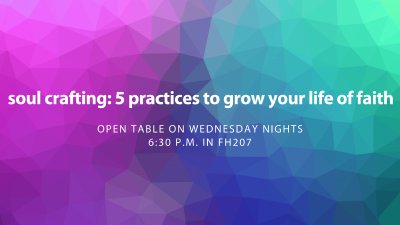


Soul Crafting
5 Practices to Grow Your Life of Faith
Soul Crafting - Session 3
Session Three – Practicing Gratitude Luke 17:11-19 On the way to Jerusalem Jesus[a] was going through the region between Samaria and Galilee. As he entered a village, ten lepers approached him. Keeping their distance, they called out, saying, “Jesus, Master, have mercy on us!” When he saw them, he said to them, “Go and show yourselves to the priests.” And as they went, they were made clean. Then one of them, when he saw that he was healed, turned back, praising God with a loud voice. He prostrated himself at Jesus’ feet and thanked him. And he was a Samaritan. Then Jesus asked, “Were not ten made clean? But the other nine, where are they? Was none of them found to return and give praise to God except this foreigner?” Then he said to him, “Get up and go on your way; your faith has made you well.” Numerous studies over the last decade have pointed to the positive health benefits of gratitude. A practice of gratitude can reduce anxiety, help with sleep patterns, ease depression, and lower blood pressure! What about gratitude is so healing in this way? Perhaps because gratitude encourages us to see life as a gift. Rather than achieving life, or getting by with life, or earning life, it is a gift. That change in understanding might encourage us to enjoy life with more joy more happiness, and more praise for the one who created life, gave us life and sustains our lives. President of Luther Seminary, David Lose, tells a story of a friend of his who always responded to the question “how are you?” by saying, “I am grateful.” Rather than saying, “I am good” or “fine” as most of us do, she would say “I am grateful.” Everyday, every time someone asked her, that was her response. What a way to be reminded that what makes you “good” is a gift from God – a gift for which we ought to be grateful. Imagine how that might have changed her day, every day, to recognize in each passing moment with a store clerk, in the elevator, or passing a co-worker, to be reminded that she is grateful. That life is a gift and one in which she is not passively receiving but receiving with joy! Surely, we all have much to be grateful for. Even in the midst of pain, grief, loneliness, and struggle, how might be receiving care. In the midst of daily life, what moments are sparking joy. In the throws of deep and unprecedented joy, there is much to be grateful for rather than proud of. Something to try: -Write a thank you note to one person who has been meaningful or done something meaningful with you recently. -Spend at least one day responding to the question, “how are you?” with “I am grateful.” Questions For Discussion: - When do you feel particularly grateful? - In what ways do you struggle to express gratitude? - How might life have changed for the leper in Luke 17? - Why do you think the other lepers did not turn back?
Soul Crafting: Week Two
November 13, 2019 • Katherine Kerr
Session Two – Building an Intentional Prayer Life Romans 8:26-27 Likewise the Spirit helps us in our weakness; for we do not know how to pray as we ought, but that very Spirit intercedes with sighs too deep for words. And God, who searches the heart, knows what is the mind of the Spirit, because the Spirit intercedes for the saints according to the will of God. Everyone’s prayer life looks different. Perhaps you know someone, like I do, who wakes up early and does a 30-minute devotional followed by prayer. Perhaps you know someone in recovery, like I do, who reads from the Big Book of AA and NA on a daily basis with prayers to follow. Perhaps you know someone, like I do, who goes to bed at night and closes the day with prayer. And perhaps you’re someone, like me, whose prayer life is haphazard and intermittent. Our faith does not detail or dictate a certain time, place, or method by which we must pray. Rather it simply encourages us to pray. And yet, we forget, we struggle to find the words, we don’t have the right place to do so, we feel uncomfortable or unsure. Again, our faith does not detail or dictate when or how or where we must pray, we are simply encouraged to do so. There is no bad time to pray, no wrong place to pray, and certainly, no wrong way to pray or words that God cannot comprehend. So, how might our lives be shaped differently if prayer became an important and intentional part of our lives? Anne Lamott who wrote the widely read book on prayer, “Help. Thanks. Wow.” It says, ““Prayer is taking a chance that against all odds and past history, we are loved and chosen, and do not have to get it together before we show up.” “Prayer means that, in some unique way, we believe we’re invited into a relationship with someone who hears us when we speak in silence.” Prayer is more than a rhythm or set aside time, though it is often that. Prayer is time in conversation with God about whatever pains our heart, and whatever brings our souls great gladness. So, before we think of how and when and where we will pray, perhaps consider what and why. Something to Try: -During one mundane task each day (washing the dishes, folding laundry, getting ready for the day, walking into work) share a prayer concern or joy with God. -Ask yourself in the morning what prayers you’d like to be mindful of throughout the day. Questions For Discussion: -Under what circumstances do you find it easy to pray? Hard to pray? -What rhythm of prayer life have you found easiest to settle into for a period of time? -Have you or how have you witnessed prayer supporting you or someone? -How do you sense the Spirit working through prayers?
Soul Crafting: Week One
November 6, 2019 • Grace Lindvall
Session One – Sabbath Leviticus 26:2 You shall keep my sabbaths and reverence my sanctuary: I am the Lord. Exodus 16:22-26 On the sixth day they gathered twice as much food, two omers apiece. When all the leaders of the congregation came and told Moses, he said to them, “This is what the Lord has commanded: ‘Tomorrow is a day of solemn rest, a holy sabbath to the Lord; bake what you want to bake and boil what you want to boil, and all that is left over put aside to be kept until morning.’” So they put it aside until morning, as Moses commanded them; and it did not become foul, and there were no worms in it. Moses said, “Eat it today, for today is a sabbath to the Lord; today you will not find it in the field. Six days you shall gather it; but on the seventh day, which is a sabbath, there will be none.” Nate Stuckey is the Director of the Farminary project at Princeton Seminary and a former professor of mine at Princeton Seminary. Nate wrote his dissertation (and a great book) on sabbath as both a gift from God and a challenge. He shares about how he has asked groups in the past to keep a 7-day time diary, what you do, for how long, and so on. After completing the time diary, take note of what is there and what is not there. For many people, rest is no where to be found. I, like you, am not the least bit surprised by this. Rest has come to be thought of as an after-thought, something to do if I get everything else done. It is most likely the first thing to go if our calendars fill up with soccer games, work meetings, weddings, family events, and time to catch up with friends. The second thing Nate notices in his research is that most people when invited to rest find that rest actually makes them more anxious, not less. If our day and our lives and our culture are defined by all that we do and accomplish, then its no wonder we find it unhelpful to pause from the work and accomplishment. Everything around us tells us we are not doing enough, we are not enough, we have not seen enough, we have not accomplished enough. So when we stop doing, we become anxious about not being or doing enough. And that’s where sabbath comes in. Sabbath is a gift from God, it’s a means of experiencing God’s grace. Like all the spiritual practices we will talk about in this series, this isn’t simply something you must do to get on God’s good side, rather it is something you can do to experience God. Sabbath is indeed rest, its also a way of looking out for God, for placing trust that God is at work when you are resting, for noticing how God is at work in the world when you slow down. Something to try: - Keep a time diary – what are you spending your time doing? - Put sabbath rest on your calendar first, before anything else. Make a promise to keep it. Discussion Questions For Connect Group - What do you struggle to “put aside until morning time” like the Israelites were commanded to do? - How do you (or others) define you by what you do or accomplish? - Why would God command sabbath? - What about sabbath rest feels impossible to you? - What about sabbath rest feels hopeful to you?


